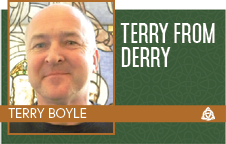
By Terry Boyle
Let me be among the many who have paid tribute to the late Sinéad O’Connor. She was a firebrand the likes of which we’ll not see again for a very long time.
Among the praises heaped upon her will be those that Morrisey calls ‘moronic’, those people from the music industry who reviled her in life for her lack of conformity. Those who despised her for exposing what Joni Mitchell referred to as the ‘star maker’s machinery behind the popular song.’
O’Connor’s music is the stuff of protest. It’s unapologetic in its confrontation of political, social and clerical injustice. Having suffered abuse in own her life, O’Connor was particularly sensitive to the victimization and exploitation of others. Her crusade, if we can call it that, was an endeavor to put right some of the wrongs that society has turned a blind eye to.
Like the prophet Jeremiah, O’Connor aimed to dramatize her resistance in a unique steam-punk manner. Tearing up the picture of the Pope in 1992 brought down an avalanche of criticism.
Actor Joe Pesci, responded by saying he would’ve ‘slapped’ her. Frank Sinatra’s response was no better ‘This must be one stupid broad. I’d kick her in the ass if she were a guy. She must beat her kids to stay in shape.’

JOAN OF ARC
O’Connor’s radicalism was a reminder to us that she was more than simply an entertainer. She was, as G.B Shaw said of Joan of Arc, a visionary ‘who, seeing farther and probing deeper than other people, has a different set of ethical valuations from theirs, and has energy enough to give effect to this extra vision and its valuations in whatever manner best suits his or her specific talents.’
Joan defied the mores of the day. She dressed as a man. She claimed to hear God for herself. She refused to be intimidated by the male patriarchy. In all that she said and did, Joan was an inspirational non-conformist.
In the exposure of matters regarding clerical abuse, O’Connor was before her time. The power of the Church was keenly felt in the way that she was pilloried for her honesty. Attacking the religious institution, from the music industry’s standpoint, was tantamount to cutting your nose off to spite your face.
At a time when she was at the height of her fame, she raged against the religious institution and proved herself to be more than just another pop singer. And, as a consequence of being authentically herself, she was shunned. She became a pariah, an outsider when in fact she was remaining true to her own values.
In the words of her song The Emperor’s New Clothes she writes; ‘And there’s millions of people/To offer advice and say how I should be/But they’re twisted and they will never be/Any influence on me.’
In taking on the institutions of power; political, religious, and commercial, O’Connor suffered for her truth at the hands of the media. Every decision she made, whether it was ordination or conversion to the Muslim faith, was ridiculed.
In the eyes of the media, her personal struggle with mental illness was treated as a topic of farce. Her very public cry for help was greeted as salacious gossip by the vultures of journalism. Each personal tragedy she experienced was yet another reason to mock and demean her.

In choosing to battle with these institutions of power, she would find herself mortally wounded. The delight and relish with which these journalists derived in seeing her flounder was sickening.
Her musical talent soon became sidelined as the media continued to define her life as a freak show. In typical fashion, they deflected us away from her message and choose to concentrate on what they perceived as aberrations. Her sexuality, religious pursuits, and family life were reduced to being simply symptomatic of a mad woman.
The vile and malicious gossip-mongering surrounding O’Connor’s life should make us angry at these tabloids. What was it they feared about this vulnerable yet strong-minded woman? What truth was she speaking that they wanted to distract us from?
O’Connor wasn’t afraid to say what she felt needed to be said. Her bravery was not blindsided by a false sense of morality or pious self-righteousness. O’Connor’s fearlessness was grounded in honesty. Asking questions that needed to be asked.
Nothing was taken at face value. If there was a hidden agenda, she believed it needed to be uncovered.
While we might not always agree on her methods, we cannot fault her insights. In staying true to herself, she resisted the temptation to sell her soul to the corporate devil. In her own words, ‘I will live by my own policies/I will sleep with a clear conscience/I will sleep in peace/Maybe it sounds mean/But I really don’t think so/You asked for the truth and I told you/Through their own words/They will be exposed.’
As a final tribute of my own, I wrote the following in appreciation of her gift and to commemorate the sad loss of a truly talented Irish singer.

Find this column and others from the September 2023 issue here!

Terry Boyle
*Terry is a retired professor now living in Southern California. Terry is originally from Derry, Northern Ireland, and in 2004 he took up a position at Loyola University, Chicago where he taught courses on Irish and British literature. Apart from teaching, Terry has had a number of plays produced and has recently been included in The Best New British and Irish Poets 2019 – 2021 (published by The Black Spring Press). He can be reached at: [email protected]





